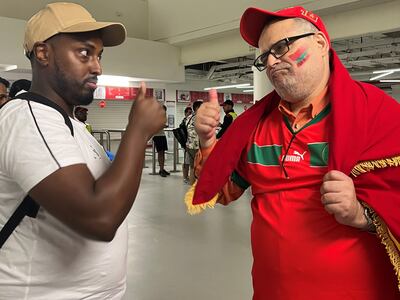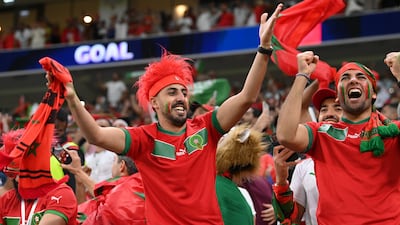It's 7am and Sharjah International Airport is abuzz with talk of a missing person.
Saudi football fans, wearing the recognisable green jersey of their national team, approach a group of Argentine supporters at the departure gates feigning deep concern.
“Excuse me,” says a young woman wearing the Saudi team scarf.
“We are just looking for Messi? Have you seen him?”
Her cheeky inquiry is a joke that went viral on social media after Saudi Arabia’s stunning World Cup victory against Argentina — a match in which Lionel Messi’s powers were rendered mute by the efficient Saudi defence.
The quip has become so popular it is now the standard Qatar World Cup greeting when seeing a Saudi football fan in public, with the reply often being variations of “he’s in my pocket.”
To their credit, the Argentines took the dig with grace and dished some shade of their own.
When realising their Saudi counterparts were joining them on their flight to Doha to experience the World Cup, they correctly predicted the Saudi side would be out of the tournament “before Sunday breakfast.”
It was a lovely moment epitomising the fun rivalry and regional pride that is coming to define the Qatar World Cup.
‘It feels like a wedding’

While the tournament is marketed as a global sporting celebration, on the ground and through the eyes of supporters from the region, this is an Arab tournament where the rest of world are invited as honourable guests.
Such a view must mean fans' support is shared — within reason — across all regional teams, thus making their matches feel like home games.
This was the hunch some friends and I acted on when we decided to watch Mena teams play at the tournament, instead of giant sides such as Brazil, France and Germany.
Our collective effort in scouring the official ticketing site bore fruit with access to matches featuring Tunisia and Morocco.
We were not only rewarded with two of the most pulsating games of the tournament, but we were given an affecting insight into fan culture, transcending the colours of jerseys and encompassing a shared history and heritage.
With many employers in Qatar offering flexible working hours during the first week of the World Cup, communities from the Mena region were able to gather to watch the games.
“This feels like a wedding,” said Tunisian fan Abdi Hamad, while standing amid a sea of supporters from his homeland outside the gates of Al Janoub Stadium an hour before his team's kick-off against Australia.

“There are about 40,000 Tunisians here in Qatar and we work in various areas like education, medicine and like me in hospitality.
"We try to create events where we can see each other but it has been tough with Covid-19 and everyone being busy.
“So seeing our countrymen play in our second home here in Qatar is the perfect chance for all of us to go out.”
And that solidarity is also heard, both in the roars reverberating through the stadium and in the whispers emanating from the venue’s numerous prayer halls during the half-time break.
When entering the space for the noon prayer, an excited Tunisian fan implores me to supplicate for a victory.
They lost to the Aussies, but perhaps a victory can be found in the sight of a community reconnected after the hardships of the past two years.
A home from home

Meanwhile, at Souq Waqif in central Doha, thousands of Moroccan fans were celebrating prior to the next day’s match against their arch rivals Belgium.
At the main courtyard near the gates of the landmark, supporters were singing folk songs and the national anthem.
“We feel comfortable here,” said Moroccan fan Abdelhadi Mountaki, who had travelled to Doha from the Austrian city of Graz.
“I have been here for three days now and what surprised me about the World Cup here is that I feel at home.
“A lot of times when Arab and African teams play, the supporters feel like we are in the minority and we really can’t express ourselves like we want to. This World Cup is different. We are now the home team and we will celebrate and support our teams in a big way.”
True to his word, Mountaki was part of the 40,000-strong crowd that turned Al Thumama Stadium in Doha into a melting pot, where the Belgians succumbed to another shock defeat.
The party atmosphere continued as we left the stadium, with fans chanting football songs and video-calling family members in Morocco to fill them in.

Draped in the Moroccan flag and cheeks smeared with streaks of red and green, Filali Said, from Tangier, couldn't decide whether he was emotional because of the victory or from the strain of a long day on his feet.
"I am tired but so happy. This is one of those moments you tell your friends and family; that you were there to see history," he says.
"The atmosphere felt like we were back in Morocco and the team felt this love from all the Arab and African fans here in Qatar with us."
With the knockout stages of the World Cup beginning on Saturday, the climb for Mena teams to the tournament's summit will feel steep, as the big sides such as Spain and Brazil show off their winning credentials.
Messi has also been seemingly found, with a commanding performance in Argentina’s victory against Mexico.
Although it appears that footballing laws of nature are steadily being restored, the Qatar World Cup has already proved that the Mena region, through its big-hearted fans and brave teams, is a force to be reckoned with.





















